The Economist ~ A review of changes to national GDP
 •
by
•
by Spite313

Dear friends,
Just over a month ago I wrote an article about the impact of the upcoming game changes on the global economies. A lot has changed since then, but many people (including me) are yet to finalise the position of all their companies.
Some factors have come into play and forced people’s hands: Bulgaria suddenly lost access to their housing bonuses this week, and the drop in housing GDP was sudden. Under normal circumstances that would not occur, but due to the ability for people to freely move companies, that money and resource could be instantly reallocated elsewhere. Similarly, the war in China has made company ownership in the cores suddenly unreliable and that too has had an impact.
To start this article, I would like to present some charts. These represent the changes between day 3903, when I wrote the first article and today, day 3938. All figures are based on an average GDP over the past 6 days (not including today). It is worth noting that the countries I have looked at are those I gathered data for previously, and this is based on the largest economies at the time. There may have been some changes but the group are still the most relevant countries.
Food GDP
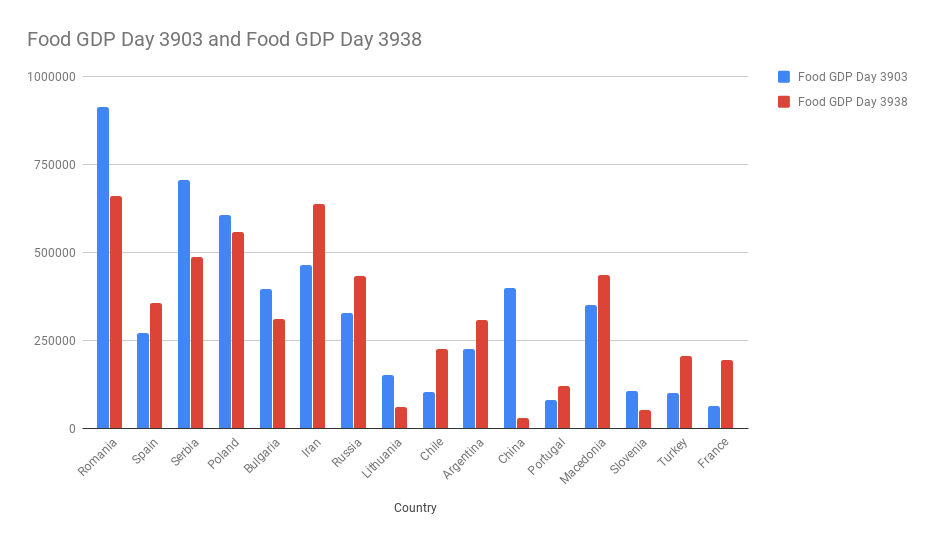
Weapon GDP
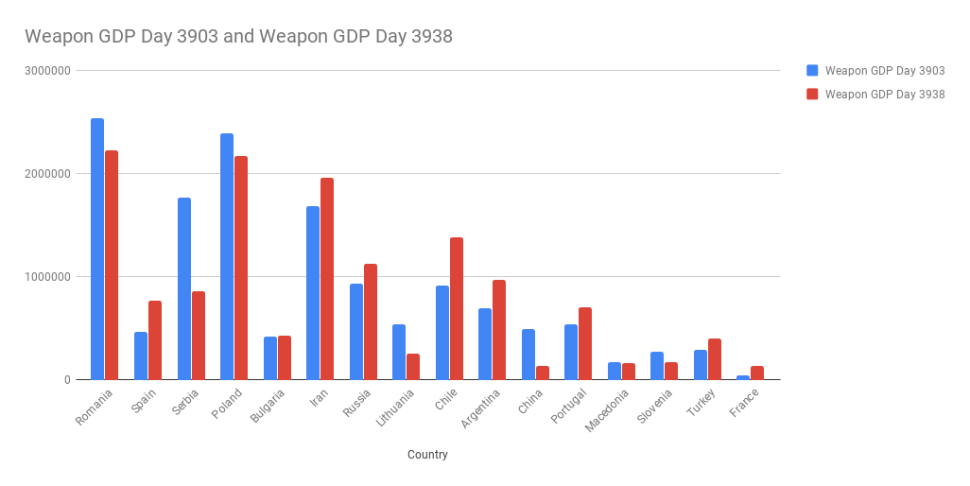
House GDP
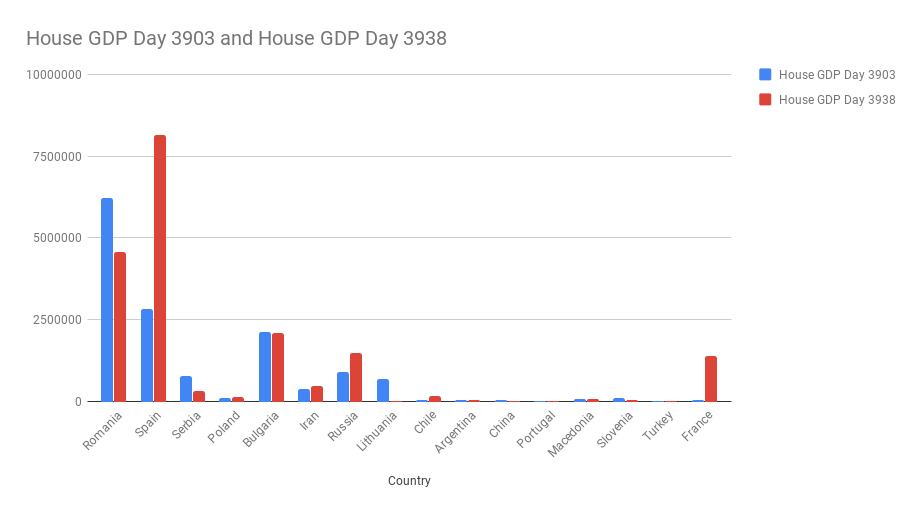
Total (combined) GDP
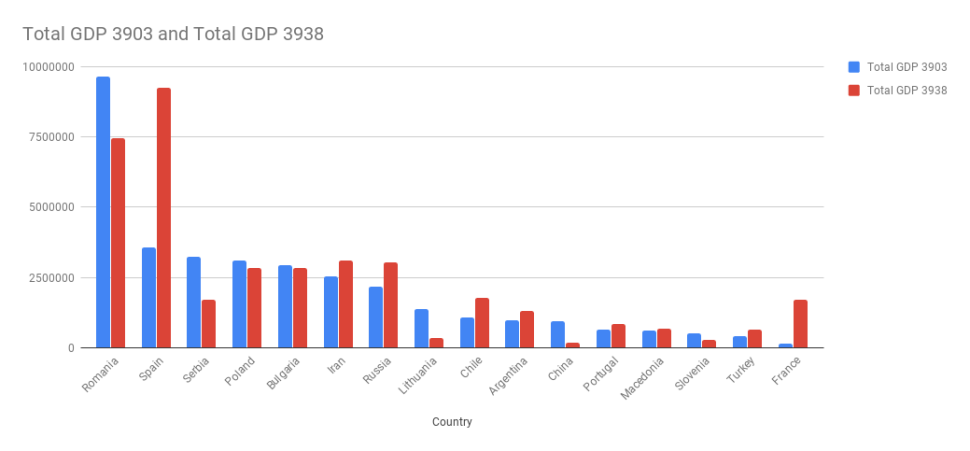
Analysis
First of all, it is important to note that the figures given by the admins are problematic at best. I have followed this up with them but I haven’t yet received any test data to understand why the numbers seem inflated. I will go into this in detail in future articles, but considering housing alone contributes 19 million in GDP per day, it is clear they are not accurate. If they were, this would mean housing consumes around 32000 work tickets per day amongst the economies listed above, which would mean every voter would have to work with at least 4 houses each day to meet demand- not even taking into consideration those workers needed for weapons.
Secondly, it is important to note there has been significant inflation since day 3903. Q1 house prices (which are the best measure for the housing market) have risen from around 2450cc to around 3150cc, a rise of around a third. Q7 weapon prices have risen from around 43cc to around 54cc, a rise of a quarter. Food prices have risen from 0.085 per unit of energy to 0.125 per unit of energy, a rise of almost 50%. Since GDP is calculated based on average sale prices (though how this average is calculated is unclear) this means that a rise in prices also creates a rise in GDP, assuming productive output remains constant.
Food is the least important of the three industries, and the most common. All players begin with food companies and although it is often more efficient to simply buy food, many people produce their own. These companies are more likely than others to be located in a nation’s home regions, even without good bonuses. Nevertheless, we did see some movement of companies, with Spain, Iran, Russia, Chile, Argentina, Macedonia, Turkey and France all having increases. The big losers in this were Romania, Serbia and China. China is currently embroiled in a war, so it is difficult to understand what has happened there. Romania and Serbia lost companies in the wake of the announcement that only 3 resources could be rented. This guarantees that neither country will have a full food bonus.
The weapons industry has remained remarkably stable so far. Serbia lost a lot of companies (around half their GDP) and these seem to have been redistributed fairly evenly amongst other high bonus countries. However overall the industry seems quite stable. Chile, with its natural 100% weapon bonus, has seen the most significant investment.
Housing is interesting again. Although personally I think investing in housing bonuses is pointless as it generates no revenue for the country, some clearly disagree. Spain and Russia both have 100% housing bonuses at present and have almost cornered the market between them. Bulgaria will now lose its housing industry, probably again to Spain. France briefly holds Florida and the companies there: this is a shiftable bonus region and will likely return to USA control at some point in the future. The remaining industry in Romania should also move in the near future given the fact they will lose much of their bonus, with most likely going to Spain. These changes make Spain the world’s largest economy overall, an unlikely scenario for a medium power and a testament to Spanish forward planning.
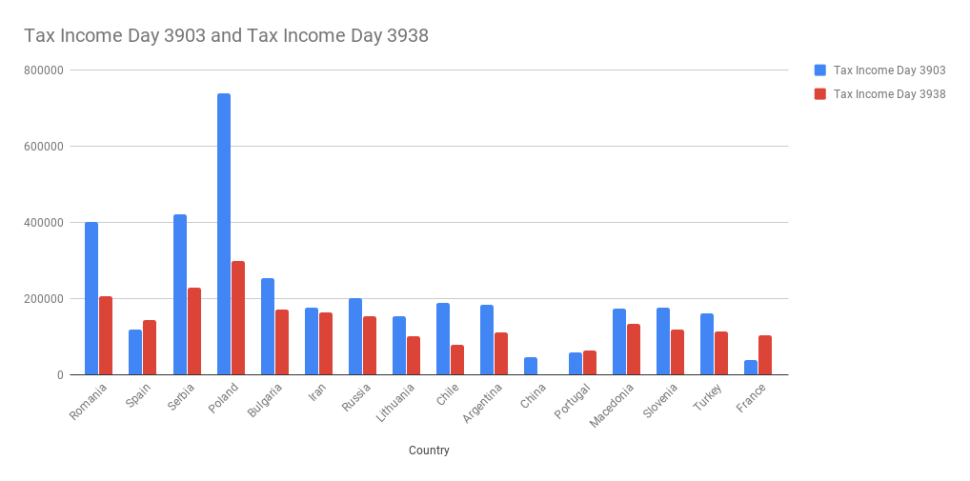
Resource concessions
In this section I will briefly discuss ‘natural’ bonuses and resource concessions for the major economies.
Romania
Romania’s best natural bonus is weapons at 70%. They will almost certainly secure Georgian rubber, though they currently have no concessions. Uncertainty over this issue is losing them industry every day and they need to move soon or risk losing a great deal of their current weapons market.
Weapons: 70%
Foo
😛25%
Housing: 25%
Spain
Spain has excellent native bonuses, missing only the 10% bonuses for weapons and food. They currently have a rental agreement with Cuba which brings their weapon bonus to 100% and this will likely stay in place for the foreseeable future. They will also be seeking a resource partner for fish to bring them up to 100% bonus in all three industries.
Housing: 100%
Weapons: 90% (+10
😵
Foo
😛90%
Poland
Poland have remained a strong country economically since their first baby boom and they continue to hold a commanding position, especially in weapons. However they have decided to rent three food resources (grain, cattle and deer) from Germany rather than the 10% iron they need to get maximum weapons bonuses. This will mean they lack full bonuses in any industry.
Weapons: 90%
Foo
😛0% (+75
😵
Housing: 0%
Iran
Iran is in a strong position with regard to both weapons and food, having 90% in both industries naturally. They have acted quickly to secure resource concessions from the Netherlands, bringing them to 100% weapons and food. They also have 70% in the housing industry, though honestly renting granite to get to 100% is probably not worth it financially speaking.
Weapons: 90% (+10
😵
Foo
😛90% (+10
😵
Housing: 70%
Russia
Russia also arrived with a strong position economically, having 90% in all three industries. Three resource concessions with France were arranged which brought them up to maximum bonuses in all three industries, making Russia an ideal place for business owners with only one holding company. What does let them down is political instability. As a member of a weaker alliance, they are more at risk of invasion than Spain or Iran and I think this has had an impact on people’s decision to base housing companies in Spain instead.
Weapons: 90% (+10
😵
Foo
😛90% (+10
😵
Housing: 90% (+10
😵
Chile
Chile is the only country with 100% natural weapon bonus in its cores. It has seen a surge in weapon GDP which likely comes from allied citizens in anti-Asteria countries. It has no food or housing bonuses and has not sought any concessions, though it currently has 90% food from occupying Bolivia.
Weapons: 100%
Foo
😛0%
Housing: 0%
Argentina
Argentina has 90% weapon and 55% food bonuses, which put it in a good place to secure 100% weapons. Currently they get the missing food bonuses by occupying Uruguay and the missing iron bonus from Nigeria. A concession agreement for iron would make the industry more secure, as there is currently a 5.29 determination in their Nigerian iron region.
Weapons: 90%
Foo
😛55%
Housing: 0%
China
Although China is currently a mess due to occupation, it has good native bonuses. With a rubber concession it would be able to boast 100% in both weapons and food. However the time is ticking on the “free movement of companies” given by the admin. Many people will already have allocated. They need to get back on the map and get a concession in place if they hope to attract investment.
Foo
😛100%
Weapons: 70%
Housing: 45%
Turkey
Like Iran, Turkey has been advertising internationally for new investors. It has slightly less good natural bonuses, at 45% weapons and 90% food. However it has successfully secured three resource concessions (fish from Albania as well as Saltpeter and Rubber from the Philippines) which bring it to 100%. How secure this is in the long run is unclear, however they have benefited significantly and gross GDP has increased by a third.
Foo
😛90% (+10
😵
Weapons: 45% (+55
😵
Housing: 0%
Portugal
A smaller country but not to be overlooked, Portugal currently commands 100% in weapons and food. It has good native bonuses and has secured a rental deal to ensure it has security in both industries going forward. Portugal’s economy is currently quite small and they have not advertised for investment. However they would be a good option with their strong alliance connections, impressive military and good bonuses.
Weapons: 90% (+10
😵
Foo
😛75% (+25
😵
Housing: 0%
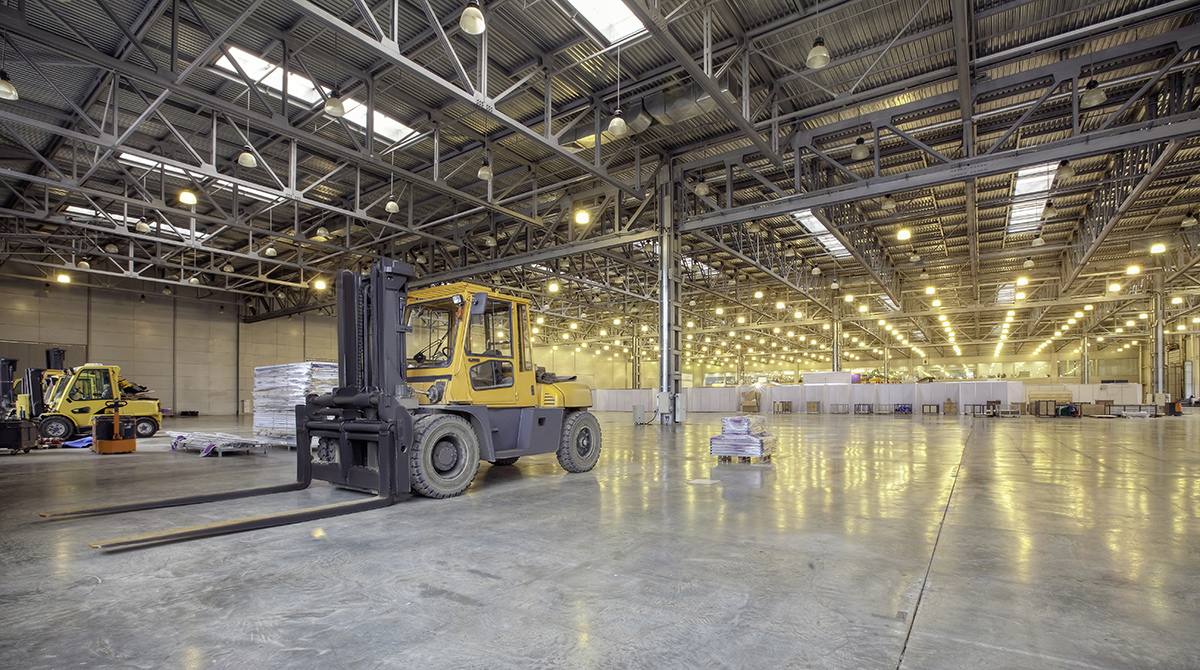
Recommendations
Personally my recommendation is always to diversify your holdings as much as possible. The economy module works in terms of years not months, but military and political changes can be much faster. It is likely that in the next year there will be military and political changes that mean not all these countries are in as good a position as they were. Wars and occupations can change things very quickly. The solution is therefore to spread your companies amongst the best options.
To choose a country to make a holding, look first at natural bonuses. Concessions are a point of failure, especially with rarer resources such as rubber. A country relying on multiple concessions can lose bonuses more easily. Plus losing a 10% bonus is not game breaking like losing a 30% one is.
Iran, Spain, Poland, Russia, Chile, Argentina and Portugal all have 90% weapon bonus or greater. Out of these, Iran, Portugal and Spain are the best options for Asteria or pro-Asteria citizens. Russia is currently with Pacifica but is a good neutral option. Argentina and Chile remain the backbone of the anti-Asteria economy.
Iran, Spain, Russia, China and Turkey all have 90% food bonuses or better naturally. Of these, Iran, Spain and China are all Asteria, Russia is again Pacifica and Turkey is broadly anti-Asteria though it has not been involved in a major war for a while. China is currently in a bit of a mix so until that resolves it is not a smart move to move companies there.
Spain and Russia are the best options for housing. Spain is the clear front runner, but naturally this has an impact on pollution. Russia could be a better option, especially if housing is not based in the region the actual housing bonuses are in, which naturally is the most polluted (and therefore has a 25% debuff).
Outliers
Serbia and Slovenia are both outliers. I have not discussed them above as they have not pursued the economic module historically and both have poor bonuses. However Turkey has managed to get itself to 100% weapons from a starting point of 45%, which is also where both Serbia and Slovenia sit in their weapons bonus. It is possible they could secure these bonuses in future. For Serbia especially this would result in a significant increase in income due to their large, elderly and wealthy population.
Conclusions
Apologies for the lengthy article. I wanted to revisit after the initial changes, but we are naturally midway through right now. I expect further changes over the next 30 days and will revisit with another article once everything has been completed.
I found that whilst some countries have been proactive about securing concessions, others have preferred to continue occupations, even with the very high determination against them in their resource regions. This is dangerous and represents a weak point for the country, where an enemy could easily do a lot of damage. This in turn makes company owners nervous about the stability of bonuses. I think this is certainly one factor in where and how company owners have moved so far.
As most people will ask, I have only moved a small part of my companies so far. I moved some of my weapons companies to Iran. On balance, I thought they were the most stable option and their foresight in securing agreements around concessions prior to the module becoming active impressed me. I also moved my housing companies to Spain, and since I had a holding there anyway I also moved some weapons companies there. My remaining companies are in Romania currently (unmoved) and I am watching the situation closely to see whether they do secure concessions. If not I will likely move them.
Thank you for reading, and if you have any questions I’d be happy to answer in the comments.
Iain
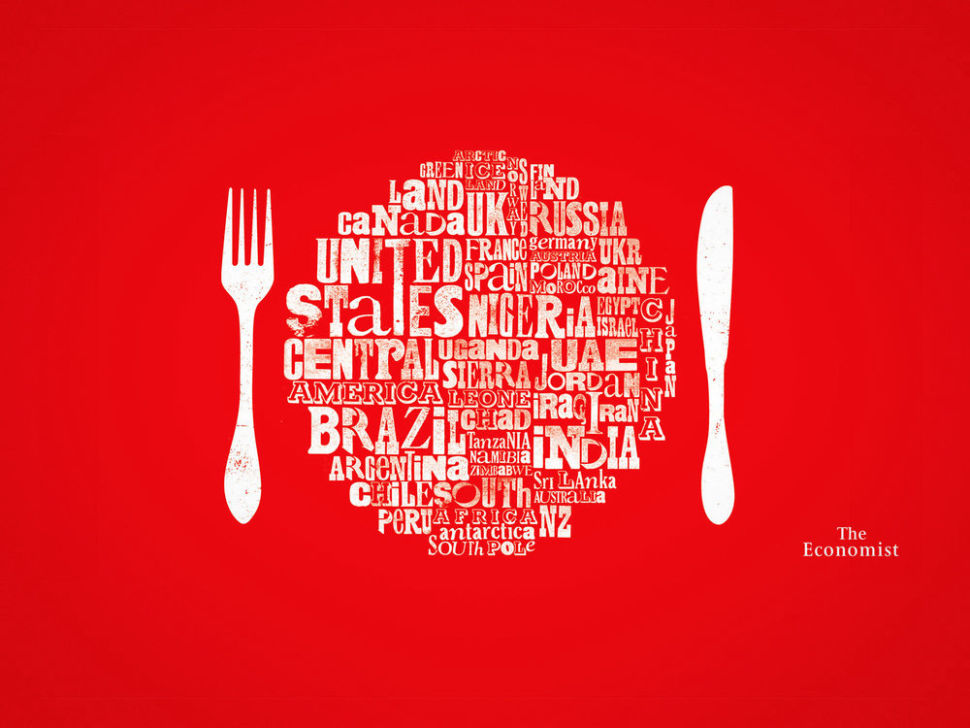
Afterword
Just briefly, it is a common criticism appearing in the comments that you ‘can’t make money’ and the ‘economy module is for fools’ or similar. I’ve always held the opinion that since I have only ever grown in wealth since starting the game that those people just need to git gud. That has been shown in stark detail this last month, where sudden rises in both wages and prices made my large stockpiles of weapons, houses and work tickets much more valuable overnight. Understanding and predicting the market is the key to success in business, and I have written a great deal about it in the past. Feel free to read through the back issues for more detail.


Comments
as great as always 😃 thank you man
It's a lady (:
France 100% food and you aint talking about 🙁
Mmmm native bonus is 70%, and Irish deer is not super reliable. But yes, it isn't bad.
whatca mean not super reliable? ;_; the concessions were also agreed before the module went live.
Why wouldn't it be reliable ?
good job
it seems I don't need to write another article xd
CRO has 100% food, 90%+10% wep. Let's not mention it in the article xD
I didn't have a point of comparison because Cro wasn't on the map (in native regions) last time when I got figures (day 3903). I have taken a snapshot this time for the next month.
100-100 atm for Croatia.
Great article, thanks for the hard work! 🙂
U miss Brazil :/
*Forgot
As with Croatia, when I did the initial accounting Brazil was wiped in their cores and so I couldn't really do it.
Didnt do the math with amount of voters and your conclusion of 5 works/day, but considering that there are thousands of accounts working and not Voting (theres no real reason to vote) + the fact that people stocked thousands of overtime points to use when salaries rise as well as hundreds of companyowners stocking works, the number of 32.000 does not seem that wrong for me.
Well looking at my employees (I have over 100) few use more than two tickets per day. And yes, there might be more workers than voters but I doubt it is a factor of 3 which is what it would have to be. If admins shared with me their calculations I'd be able to verify but so far they haven't.
Thx Iain
The thing to consider about risk of invasion is that if a country has 100% bonus and people around the world have factories there then there is an incentive not to invade as it'll probably impact the invaders own citizens.
That was the argument used about the USA but they got wiped.
While the exact numbers won't be known obviously, what percentage of workers for those countries who invaded and wiped the US had factories in the US? I suspect few. Prior to the changes then there would be half a dozen options for each resource allowing for distance and pollution considerations. If as a result of the changes there is only a couple or valid countries then a wider range of different national workers in each of those countries.
Actually it was a significant number. Before the war the majority of the housing industry was based in Florida. The USA had excellent bonuses and a lot of Croatians and Bulgarians had companies there, as well as Serbs.
Spain FTW
o7
P.S house industry almost all work on bots and workers from Tycoon pack so 32k numbers of wokrs only in house its ok 😛
Well I don't know numbers for tycoon pack, but 150 tickets or whatever you get doesn't cover much. Agree there is a problem with bots but based on average wages it is not a huge problem (or people pay bots well, in which case there is no difference)
minimum salary in ro 8 in srb 1 so have bots is in profit 😛
https://www.erepublik.com/en/economy/job-market/65/67/desc
Tycoon pack give you 150 work tickets;
+20% productivity bonus for 7 days;
And you can buy TP every 10days 😉
I think you misunderstood, if you look at the average wage on the country page, it's usually between 10-20% below the best market wage. If we assume that this is because of bots being paid 8cc, that means probably 10-20% of employees are bots or working in communes.
more bots 😛
to get average 480
66%(real workers) *720=47520
34%(bots) *8=272
47792/100=477.92
Huh?
If you had 100 workers, and 66 of them earned 500cc (for the sake of argument), and 34 earned 8cc, the mean average would be ~332cc.
It's hard to calculate now because the mean average is over 30 days and wages have been steadily rising. However I don't think more than 10-15% of the workforce in most countries are bots/commune workers.
I see- 480 is the current Romanian mean wage. But wages have risen so quickly it is not possible to have a 30 day average close to the current top wage. That will flatten out soon enough- and before wages went crazy it was pretty close to the top wage. I wrote an article which looked at median wage: https://www.erepublik.com/en/article/the-economist-work-tax-revisited-2670295/1/20
Good job
Thank you lain.
Omigoto!
thank you Iain o7
Perfectly implemented. Very informative.
Thanks for your article. o7
P.S. I like long and detailed articles as long as they are written as you you do. Keep the good work continue 🙂
vote
Yeah.
V.
thanks
Can holdings be moved for free too, or only companies?